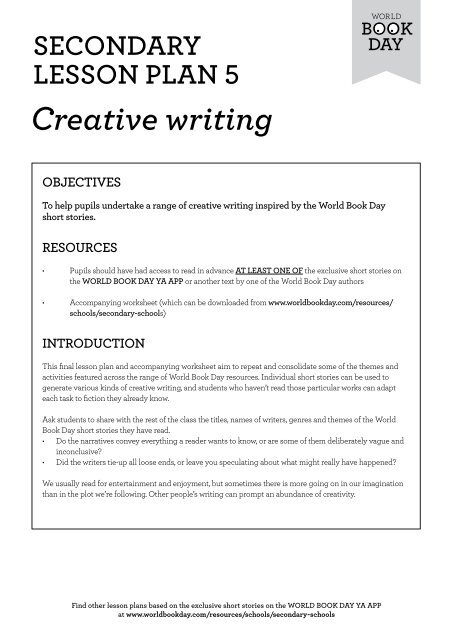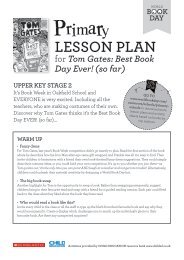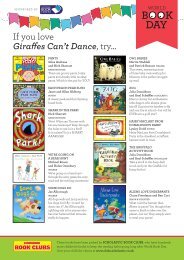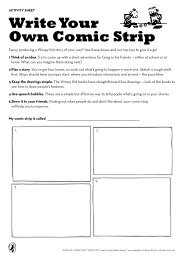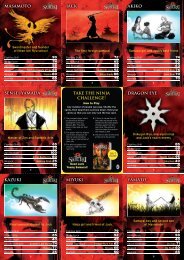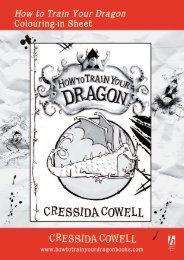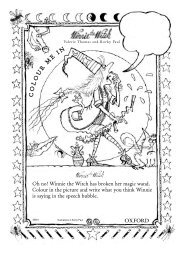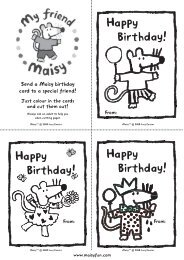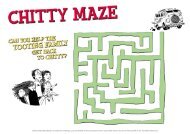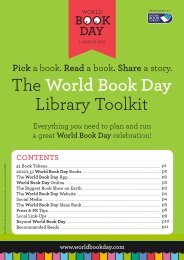Creative writing - World Book Day
Creative writing - World Book Day
Creative writing - World Book Day
Create successful ePaper yourself
Turn your PDF publications into a flip-book with our unique Google optimized e-Paper software.
secondary<br />
lesson plan 5<br />
<strong>Creative</strong> <strong>writing</strong><br />
Objectives<br />
To help pupils undertake a range of creative <strong>writing</strong> inspired by the <strong>World</strong> <strong>Book</strong> <strong>Day</strong><br />
short stories.<br />
resources<br />
• Pupils should have had access to read in advance AT LEAST ONE OF the exclusive short stories on<br />
the WORLD BOOK DAY YA APP or another text by one of the <strong>World</strong> <strong>Book</strong> <strong>Day</strong> authors<br />
• Accompanying worksheet (which can be downloaded from www.worldbookday.com/resources/<br />
schools/secondary-schools)<br />
introduction<br />
This final lesson plan and accompanying worksheet aim to repeat and consolidate some of the themes and<br />
activities featured across the range of <strong>World</strong> <strong>Book</strong> <strong>Day</strong> resources. Individual short stories can be used to<br />
generate various kinds of creative <strong>writing</strong>, and students who haven’t read those particular works can adapt<br />
each task to fiction they already know.<br />
Ask students to share with the rest of the class the titles, names of writers, genres and themes of the <strong>World</strong><br />
<strong>Book</strong> <strong>Day</strong> short stories they have read.<br />
• Do the narratives convey everything a reader wants to know, or are some of them deliberately vague and<br />
inconclusive?<br />
• Did the writers tie-up all loose ends, or leave you speculating about what might really have happened?<br />
We usually read for entertainment and enjoyment, but sometimes there is more going on in our imagination<br />
than in the plot we’re following. Other people’s <strong>writing</strong> can prompt an abundance of creativity.<br />
Find other lesson plans based on the exclusive short stories on the WORLD BOOK DAY YA APP<br />
at www.worldbookday.com/resources/schools/secondary-schools
starter activities<br />
1.<br />
2.<br />
With their <strong>World</strong> <strong>Book</strong> <strong>Day</strong> short stories in mind, ask students to think of any aspects that left them still<br />
wondering once the story had been read. Were there characters they would have liked to know more about?<br />
Invite pupils to write down three quandaries or questions about plot details or characters in their short<br />
story, which remained unanswered. These might be points they would choose to put to the author. Short<br />
stories are tricky to write because there is little room to fit in a lot of detail, so writers can intentionally<br />
decide to leave people and situations open to interpretation. They may welcome their readers engaging<br />
in fantasy. Once students have raised a few questions and noted some unfinished business in their<br />
narrative, they can try to find answers from their own imagination.<br />
development<br />
The main assignment pupils will be working towards is either a story of their own, which will be invented<br />
completely from scratch, or a continuation of one of the short stories with ends that need tying-up. For<br />
whichever option, students should complete a series of preparation exercises, which will enhance the quality<br />
and richness of their final piece of <strong>writing</strong>. Whether pupils choose to write something totally original or<br />
extend part of their chosen short story, they will need to work on the following:<br />
• Genre<br />
Which genre will their story fit? They are free to alter the genre of their influential short story to suit<br />
their own imagination.<br />
• Character profiles<br />
Who will be their main characters? Before beginning their creative <strong>writing</strong>, ask students to invent at<br />
least one leading protagonist and develop a profile for him/her. This should include name, age, where<br />
he/she is from, appearance, skills, family relationships, other significant people in his/her life and<br />
similar details that may be of relevance or interest.<br />
• Plot timelines<br />
Students will need to think about plots and timelines before starting their piece of fiction. Completing<br />
a horizontal or vertical plot timeline should help them decide the chronological order of their action.<br />
• Opening paragraph<br />
Opening paragraphs are significant because they establish a lot of information in a limited number<br />
of words, and hook readers from the outset. It is worth pupils working and re-working the beginning<br />
of a story, in order to make it as effective as they can. The genre, setting, main characters and <strong>writing</strong><br />
style should be established from the start.<br />
All of these tasks are development activities to prompt inventiveness. However, no decisions need be final.<br />
Students can change anything at any time, as long as alterations and corrections are consistent.<br />
Find other lesson plans based on the exclusive short stories on the WORLD BOOK DAY YA APP<br />
at www.worldbookday.com/resources/schools/secondary-schools
Main Exercise<br />
Bearing all the Development activities in mind, students should undertake an extended piece of creative<br />
<strong>writing</strong>. This can incorporate plot details, characters and other aspects of a short story they have read, or be<br />
a completely new piece of fiction. Even if pupils write an original tale, they can draw on examples of good<br />
practice from the short story they chose to read. They need to:<br />
• select a genre<br />
• plan their plot<br />
• create convincing characters<br />
• write a powerful opening paragraph<br />
• keep their <strong>writing</strong> style interesting, clear and engaging<br />
Plenary<br />
• Ask pupils to reflect on what they have learnt about <strong>writing</strong> stories.<br />
• Encourage them to read their opening paragraphs to each other and assess their effectiveness. Is it<br />
easy to spot the genre? Does the start of the story successfully set the scene and leave the audience<br />
wanting more?<br />
Key Stage 3 English Curriculum<br />
(AF = Assessment Focus)<br />
This scheme of work supports the following areas of the curriculum:<br />
READING<br />
AF3 Deduce, infer or interpret information, events or ideas from texts.<br />
WRITING<br />
AF1 Write imaginative, interesting and thoughtful texts.<br />
AF2 Produce texts which are appropriate to task, reader and purpose.<br />
AF3 Organise and present whole texts effectively.<br />
AF4 Construct paragraphs and use cohesion within and between paragraphs.<br />
AF5 Vary sentences for clarity, purpose and effect.<br />
AF7 Select appropriate and effective vocabulary.<br />
It is also suitable for library lessons and will complement the Accelerated Reader Programme.<br />
Find other lesson plans based on the exclusive short stories on the WORLD BOOK DAY YA APP<br />
at www.worldbookday.com/resources/schools/secondary-schools
secondary<br />
worksheet 5<br />
Writing stories<br />
Imagine that!<br />
• Short stories are tricky to write because there is little room to include many details. Authors<br />
often deliberately choose to leave some characters and situations open to interpretation.<br />
• Think carefully about the <strong>World</strong> <strong>Book</strong> <strong>Day</strong> short story you have read. Are there any loose ends?<br />
• Write down three questions about plot details or characters in your short story, which remained<br />
unanswered at the end.<br />
• Now use your imagination to speculate and suggest your own explanations for those<br />
predicaments.<br />
Pulling stories together<br />
You are working towards <strong>writing</strong> a story of your own, or continuing one you have already<br />
read. For whichever option, there are preparation exercises to do and you’ll need to make<br />
some decisions:<br />
• Choosing a genre Which genre will your story fit? You are free to alter the genre of your<br />
influential short story. Use your imagination. Anything goes!<br />
• Character Profiles Who will be your main characters? Invent at least one leading hero/<br />
heroine and develop a profile for him/her (this can include name, age, where he/she is from,<br />
appearance, skills, family relationships, other significant people in his/her life and any other<br />
relevant details).<br />
• Plot Timelines Think about your plot and timeline. Try completing a horizontal or vertical<br />
‘plot timeline’, to sort out the chronological order of your action.<br />
• Opening Paragraph Opening paragraphs have to establish a lot of information in a<br />
limited number of words and hook the reader from the outset. You will need to establish your<br />
genre, setting, main characters and <strong>writing</strong> style from the very beginning. Work and re-work<br />
the start of your story and make it as effective as you can.<br />
All of these tasks will help you prepare for your story <strong>writing</strong>. You can change planned<br />
ideas at any time, as long as alterations are consistent.<br />
join<br />
<strong>Creative</strong> <strong>writing</strong><br />
• Developing the ideas you began in the Pulling stories together activities, now have a go at<br />
undertaking an extended piece of creative <strong>writing</strong>. This can incorporate plot details, characters<br />
and other aspects of a short story you have read, or be a completely new piece of fiction.<br />
• You must select the genre, plan the plot, create convincing characters, write a powerful opening<br />
paragraph and keep your <strong>writing</strong> style interesting, clear and engaging throughout.<br />
Find the latest reviews, recommendations and competitions at<br />
www.worldbookday.com/community/worldbookdayya


